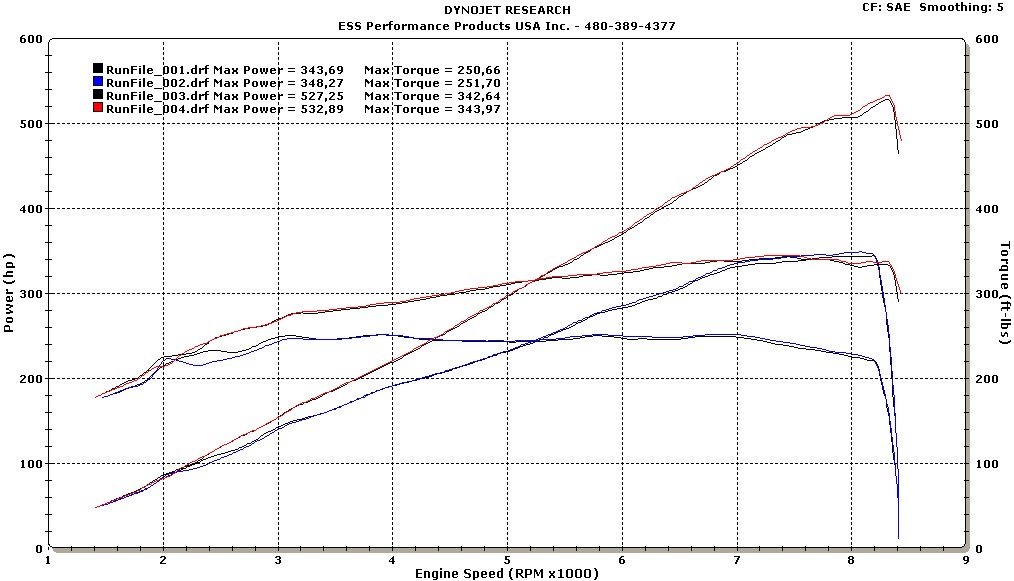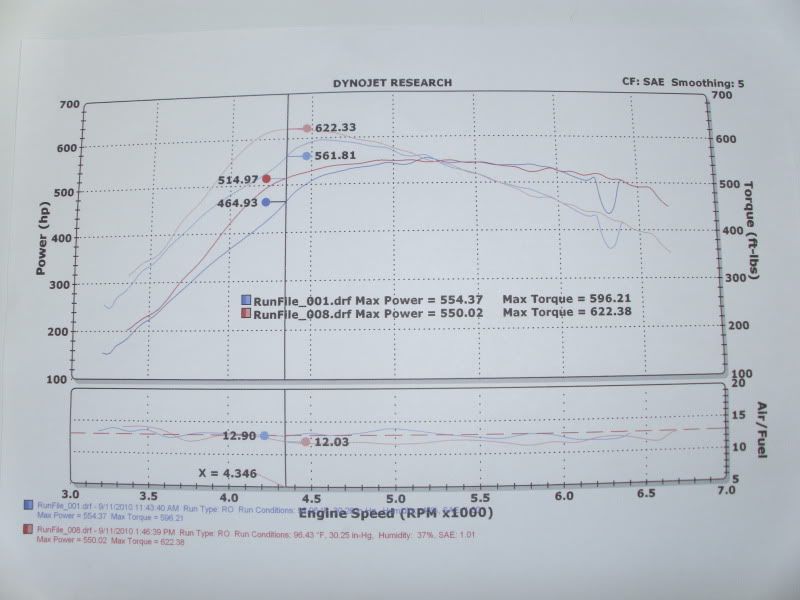the reason why power and energy are useful concepts is as follows
to go up a hill in a requires a change of potential energy as you do work against gravity.
the faster you want to go up the hill means you do it in less time then the more power you need because work/time is POWER
also
if you want to change speed from say 60mph to 120mph this requires a change in kinetic energy
the faster you want to do this i.e. in less time the more power you need because work/time is POWER
torque without rpm is useless for acceleration and motion thats why anyone that works with things moving trys to maximise power that is available as this inhenrently maximise forces the provide propulsion
torque or horsepower
Collapse
X
-
now i see your graph you make alot of midrange power such that the power curve is flat. so the hp is always there on tap. if you had a more linear increasing type curve such as a centrifugall blower with less area under the curve but higher peak you would need alot of closely spaced gears to be quicker if at all. graph below "only" shows 520hp but you get the idea about area under the curve and hp that is available in midrange being lower. yours has 500hp for 2500 band of rpms the other for 600rpm

so your midrange torque helps but it is the power that results from this that helps (more midrange torque = more mid range power). if you had the same midrange torque but topend torque fell off quickly and hp peaked alot lower you would be quite a bit slowerLast edited by digger; 03-28-2014, 03:35 PM.Leave a comment:
-
its usually and cheape to remove 20% weight than gain 20% hp and the braking and handling would also benefit so best BFYBI have always liked this video. You dont have to have alot of HP to go fast. http://www.streetfire.net/video/hors...hit_179480.htmLeave a comment:
-
I have always liked this video. You dont have to have alot of HP to go fast. http://www.streetfire.net/video/hors...hit_179480.htmLast edited by QUKBMER; 03-28-2014, 01:43 PM.Leave a comment:
-
-
Good post.I have had this debate many times and while torque is what you feel and what moves the car...HP is what makes it useful because it represents torque x rpm. Rpm is critical here because it is the number of revolutions over time. Torque by itself is meaningless when it comes to how powerful an engine is. In contrast, higher rpm's can get more power to the wheels through shorter gearing. Now the debate goes on and on because people who are pro-torque are actually talking about HP. There's a reason we use it to rate engines.
Look at our cars..
Eta engine has 170 ft/lbs torque but only 121hp @4200 rpms 2.79 or 2.93 final drive.
325I engine has 165ft/lbs torque but 168hp @5800 rpms 3.73 final drive.
We know the 325i is faster than the eta because the 325I is getting more power to the wheels. It's area under the curve is actually greater than the eta even though it has more torque because the eta cannot rev past 5000 rpm while the 325I still has a couple thousand rpm's to play with. In layman's terms the eta is fast off the line but it can't sustain it over time. If you put a 3.73 in the eta, it will be faster upto a point but it will run out of rpm's faster and it's top speed will be limited.
This is why 1.6 liter Honda engines can be fast in a sprint. They can make good HP and put it down through very short gearing. Cars like the s2000, e30 m3, itr all have similar traits...high hp/rpms from small displacement. This is the basis for road race engines. Few people like peaky cars on the street though so for stoplight racing most prefer to have more low end torque.Leave a comment:
-
Instead of trying to argue, why don't you read the thread and links? Horsepower has nothing to do with comparing a horse to what an engine can do, and definitely is not subjective as it's based on actual data.
1 hp = the ability to move 550lbs 1ft in 1sec (33,000lb in one minute). Forget that it's called "horsepower", it's the ability to move an object xx to xx in xx amount of time. Since we do not have an accurate way to measure this (specially if the vehicle/engine is stationary), we can measure rotational torque on a dyno, and it is calculated as such.Leave a comment:
-
-
I have had this debate many times and while torque is what you feel and what moves the car...HP is what makes it useful because it represents torque x rpm. Rpm is critical here because it is the number of revolutions over time. Torque by itself is meaningless when it comes to how powerful an engine is. In contrast, higher rpm's can get more power to the wheels through shorter gearing. Now the debate goes on and on because people who are pro-torque are actually talking about HP. There's a reason we use it to rate engines.
Look at our cars..
Eta engine has 170 ft/lbs torque but only 121hp @4200 rpms 2.79 or 2.93 final drive.
325I engine has 165ft/lbs torque but 168hp @5800 rpms 3.73 final drive.
We know the 325i is faster than the eta because the 325I is getting more power to the wheels. It's area under the curve is actually greater than the eta even though it has more torque because the eta cannot rev past 5000 rpm while the 325I still has a couple thousand rpm's to play with. In layman's terms the eta is fast off the line but it can't sustain it over time. If you put a 3.73 in the eta, it will be faster upto a point but it will run out of rpm's faster and it's top speed will be limited.
This is why 1.6 liter Honda engines can be fast in a sprint. They can make good HP and put it down through very short gearing. Cars like the s2000, e30 m3, itr all have similar traits...high hp/rpms from small displacement. This is the basis for road race engines. Few people like peaky cars on the street though so for stoplight racing most prefer to have more low end torque.
Here's a good link that explains things better.
http://www.houseofthud.com/cartech/t...horsepower.htm
Here's a quote: "Maximum acceleration of a car is made possible by maximizing your output
torque at the wheels at ALL times."
So we see that torque at the wheels is what moves the car sure but "at ALL times?"...now we are actually talking about HP as defined by (Torque x RPM) / 5252. In cars with transmissions and final drives, gearing is always a factor. Raise the RPM, you raise the HP regardless of engine torque...then through gearing you can get max torque to the ground throughout the RPM range. The problem with torque is that it is just a force without time and isn't really useful in describing the performance of an engine by itself.Last edited by reelizmpro; 03-28-2014, 12:55 PM.Leave a comment:
-
-
nope watt is power, so its 1000w of power (not energy of 1000W) but energy is power x time = 1000W x 3600s = 3600kJhere's another reason why using the unit horsepower is dumb when talking about motors.
energy which is power multiplied by time can be measured in units of horsepower, watts, or btu's per hour. one horsepower is equal to 746 watts and 746 watts is equal to 2545 BTUs/hr.
so if you had a 1000 watt lightbulb and you lite it for 1hour the lightbulb would have the engery of 1000watts, 2545 BTUs/hr or 1.34 horsepower. knowing this you can now impress your friends by telling them that your 165 horsepower engine is just as powerful as 1231 - 100 watt lightbulbs, that should do the trick!
the electricity used to power a 1000W bulb could be used to power an electric motor that has 1000W which would be the same as a 1000W Internal combustion engineLast edited by digger; 03-28-2014, 01:29 AM.Leave a comment:
-
digger, would you care to explain in laymen's terms WTF this means, because all I get from it is psychobabble.Leave a comment:
-
here's another reason why using the unit horsepower is dumb when talking about motors.
energy which is power multiplied by time can be measured in units of horsepower, watts, or btu's per hour. one horsepower is equal to 746 watts and 746 watts is equal to 2545 BTUs/hr.
so if you had a 1000 watt lightbulb and you lite it for 1hour the lightbulb would have the engery of 1000watts, 2545 BTUs/hr or 1.34 horsepower. knowing this you can now impress your friends by telling them that your 165 horsepower engine is just as powerful as 1231 - 100 watt lightbulbs, that should do the trick!Last edited by tom d; 03-27-2014, 09:21 PM.Leave a comment:


Leave a comment: